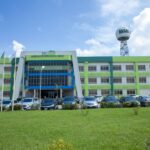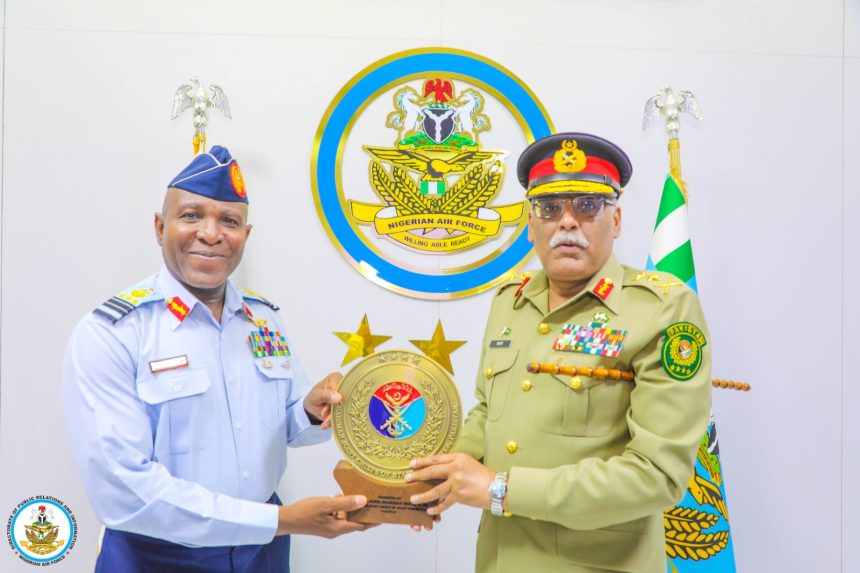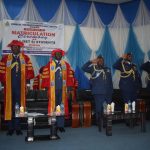Aleke Aleke in Abuja
The Chairman Joint Chiefs of Staff Committee of the Islamic Republic of Pakistan, General Sahir Shamshad Mirza, has applauded Nigeria’s role as a regional power and a pillar of stability in the continent of Africa.
General Mirza gave this commendation when he led a high-powered delegation on a courtesy visit to the Chief of the Air Staff (CAS), Air Marshal Hasan Bala Abubakar, at the Headquarters of the Nigerian Air Force (NAF) in Abuja.
He emphasized the strength, pride, and influence of Nigeria’s military within and beyond Africa. Describing Nigeria as more than just a country, General Mirza said, “Nigeria is a regional power and a force to be reckoned with.”
He stressed that Pakistan holds in high regard the professionalism and resilience of the Nigerian Armed Forces, and deeply respects Nigeria’s role in promoting regional peace and security.
A statement by the Director of Public Relations and Information, Nigerian Air Force, Air Commodore Ehimen Ejodame, said the visit underscored the enduring defence cooperation between the two nations, with both leaders highlighting shared experiences in counter-terrorism, peacekeeping, and strategic capacity-building.
General Mirza showcased Pakistan’s defence manufacturing capabilities, including unmanned aerial vehicles (UAVs), trainer and combat aircraft, and anti-aircraft systems, while extending a formal invitation to Air Marshal Abubakar to visit Pakistan for continued strategic dialogue.
In his remarks, the Chief of the Air Staff (CAS), Air Marshal Abubakar, warmly welcomed the Pakistani delegation and acknowledged the significant contributions of Pakistan to Nigeria’s air power development.
“The Nigerian Air Force has benefited tremendously from our defence partnership with Pakistan, particularly in areas such as pilot training, aircraft acquisition, and logistics,” he said.
The CAS also highlighted a broad spectrum of opportunities in Nigeria, including its esteemed military training institutions, which could offer valuable benefits to Pakistan.
He expressed strong interest in deepening cooperation in pilot training, research and development (R&D), and aircraft technology, affirming Nigeria’s commitment to self-reliance through innovation and international partnerships.
“Both leaders reaffirmed their shared vision for stronger bilateral defence ties. Key topics discussed included continued engagements on aircraft platforms such as the JF-17 Thunder and Super Mushshak, which are central to Nigeria’s modernisation goals.
“Both sides expressed optimism for a future marked by deeper strategic cooperation, enhanced technological exchange, and a commitment to collective security development, emphasising the importance of mutual trust, shared values, and sustained dialogue to address global challenges and promote regional stability,” the NAF spokesperson stressed.
Meanwhile, the Service, in a separate development, intensified its Civil-Military Relations (CMR) efforts across all theatres of operation, as part of its renewed commitment to non-kinetic operations and meaningful community engagement.
The Chief of the Air Staff (CAS), Air Marshal Hasan Abubakar, stressed that “In every flight we take, every mission we complete, we honour our commitment to protect the freedom and future of our citizens.”
The NAF Spokesperson, in statement, said that, guided by this principle and in line with the CAS’ directive to prioritise community-focused initiatives, the Air Component Commander of Operation Fansan Yamma initiated an impactful intervention at Kurhundu Primary School in Katsina State.
He noted that the Air Component Commander of Operation Fansan Yamma, Air Commodore Ibrahim Jibia, launched a series of strategic engagements to support local education.
The spokesperson said, “Following the initiative, the NAF unit donated vital learning materials to pupils of Kurhundu Primary School and conducted comprehensive assessments of the school’s infrastructure and learning environment during multiple visits.
“During the visits, the NAF team engaged directly with teaching staff, sharing effective learning techniques and modelling best practices in classroom settings. In a bid to address the infrastructural challenges identified, the NAF unit went further to renovate one of the school’s classrooms, significantly improving the learning environment for the pupils.” Inspired by this intervention, the Katsina State Government also undertook the renovation of an additional classroom and approved the construction of a new classroom, which is currently ongoing.”












